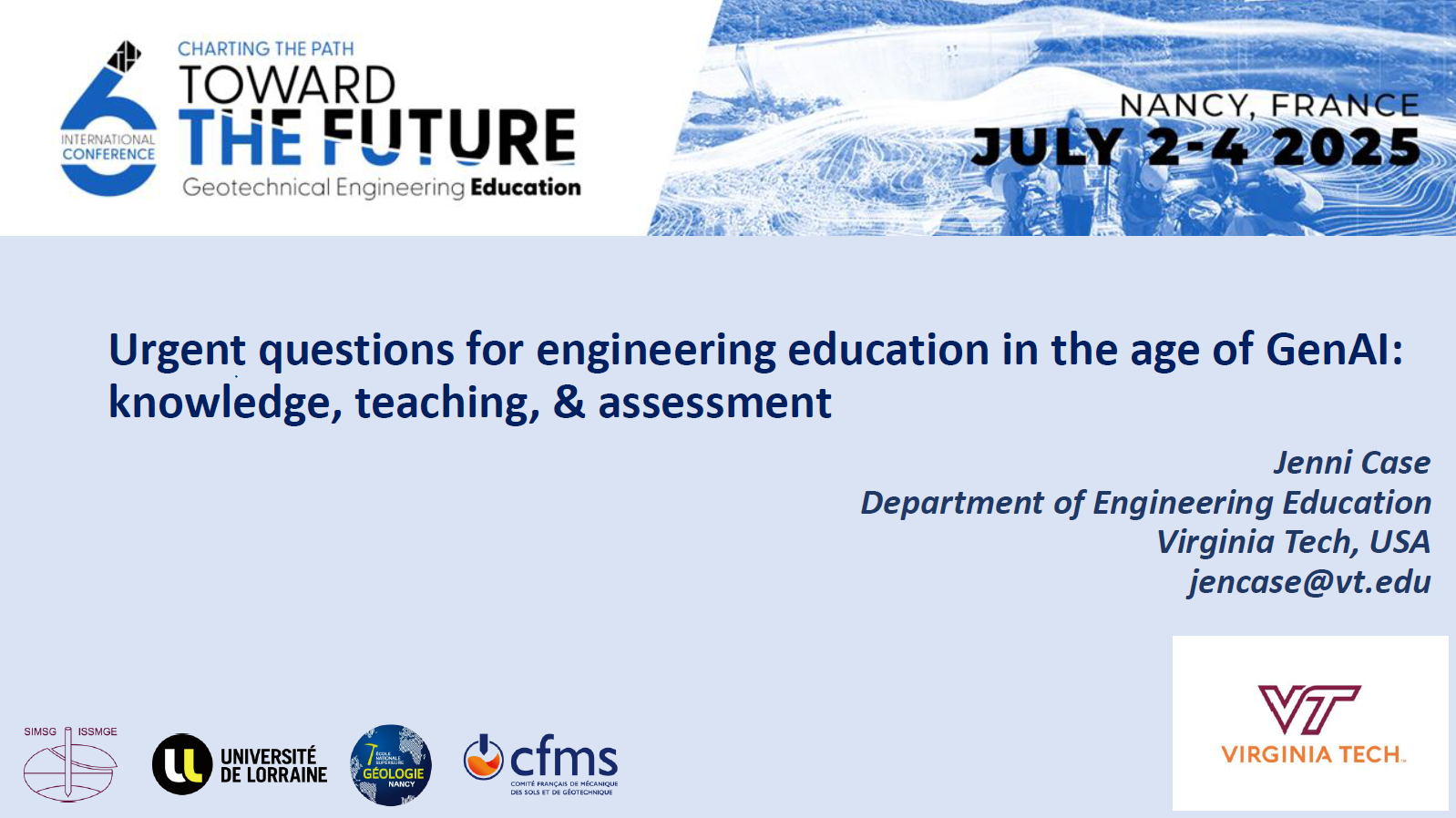About
Urgent questions for engineering education in the age of genAI:
Revisiting approaches to knowledge, pedagogy & assessment
The rapid developments in generative AI have brought with them a sense of urgency for rethinking education. Part of this breathlessness is likely associated with the business imperative – pursuit of revenue potential not yet realized for these new tools. But it’s undeniable that this freely available technology, now on everyone’s laptop and phone, raises significant questions we cannot ignore. Current responses range from the latest utopian visions of teacher-free education, to cautious engagement focused on ethical dilemmas, through to resistant perspectives envisioning a dystopic future if we don’t batten down the hatches.
In this talk, Jenni Case argues that these questions should prompt a renewed and urgent engagement with the core issues at the heart of engineering education: What do students need to know, as well as what do they need to do, and who do they need to become? How do we create educational environments in which such learning can occur? What is the role of the teacher? And how can we be sure that learning has happened?
These questions require us to re-engage firstly with what the curriculum should look like. While the engineering curriculum is oriented toward what engineers need to be able to do in the workplace, there is no simple reverse engineering from practice to curriculum. Formal education has its own internal logic and outcomes are emergent and not fully determined from inputs - in this way differing fundamentally from on-the-job training. Using a tripartite model of knowing, acting, and being, this talk shows that the neglect of knowledge renders the other two elements unstable. There is no content-free critical thinking or lifelong learning. Crucially, a professional will always be defined by the knowledge they are able to recruit to address complex real world problems.
Engineering education research has a crucial role to play in addressing these questions. Importantly, we must move beyond research focused solely on “what works”. The questions we now face require a deep engagement with the purposes of engineering education and the core values that underpin it. A focus on knowledge requires that we identify the core concepts needed for each engineering discipline and to formulate the pedagogical content knowledge that teachers will need to deploy to enable students to master difficult concepts. Much of the current discussion around generative AI has of course been focussed on the validity of assessment given the ubiquity of new tools that can allow for the bypassing of actual learning and mastery. It also seems unavoidable that we must seriously rethink our methods of assessment in order to be able to be confident that we are producing engineering graduates equal to the challenges that they will face in their future careers.
Presentation Slides: Case-GEE2025.pdf



![2nd John Burland Lecture: Reflections on Some Contemporary Aspects of Geotechnical Engineering Education - From Critical State to Virtual Immersion {"category":"webinar","subjects":["Education"],"number":"GEE2020-1","instructors":["Mark Jaksa"]}](/asset-v1:ISSMGE+GEE2020_1+2020+type@asset+block@Jaksa-Intro-Slide.jpg)
![Forks in the Road: Rethinking Modeling Decisions that Defined Teaching and Practice of Geotechnical Engineering {"category":"webinar","subjects":["Education"],"number":"GEE2020-2","instructors":["Rodrigo Salgado"]}](/asset-v1:ISSMGE+GEE2020_2+2020+type@asset+block@Salgado-Intro-Slide.jpg)
![Prior Knowledge, Learning and Common Instructional Practices Grounded in Evidence {"category":"webinar","subjects":["Education"],"number":"GEE2020-3","instructors":["Susan A. Ambrose"]}](/asset-v1:ISSMGE+GEE2020_3+2020+type@asset+block@Ambrose-Intro-Slide.jpg)
![Basic Geotechnical Engineering Skills What Can Graduated Do? (First John Burland Lecture) {"category":"honour_lecture","subjects":["Education"],"number":"HJBL101","instructors":["John Atkinson"]}](/asset-v1:ISSMGE+HJBL101+2016+type@asset+block@1475823575-John-Atkinson-Webinar.jpg)
![Soil-Bentonite Slurry Trench Wall Lateral Deformation, Consolidation, and State-of-Stress {"category":"webinar","subjects":["Education"],"number":"TC211-03","instructors":["Jeffrey Evans"]}](/asset-v1:ISSMGE+TC211-03+2024+type@asset+block@SB_Photo.jpg)
![3rd John Burland Lecture | Changing attitudes, organization and scale in engineering education: The teacher as a go-between and TC306 as a knowledge broker {"category":"honour_lecture","subjects":["Education", "Teaching Geotechnics"],"number":"TC306-GEE2025-01","instructors":["Marina Pantazidou"]}](/asset-v1:ISSMGE+TC306-GEE2025-01+2025+type@asset+block@pantazidou.png)
![New challenges in rock mechanics: Building new skills in engineering education {"category":"talk","subjects":["Education"],"number":"TC306-GEE2025-04","instructors":["Jean Sulem"]}](/asset-v1:ISSMGE+TC306-GEE2025-04+2025+type@asset+block@sulem.png)
![What role should software play in geotechnical education? {"category":"talk","subjects":["Education", "Numerical Analysis"],"number":"TC306-GEE2025-06","instructors":["Nicolas Utter"]}](/asset-v1:ISSMGE+TC306-GEE2025-06+2025+type@asset+block@utter.png)
![Geosynthetics in the Classroom: Educating Future Engineers and Their Instructors {"category":"honour_lecture","subjects":["Education", "Teaching Geotechnics"],"number":"TC306-GEE2025-07","instructors":["Jorge G. Zornberg"]}](/asset-v1:ISSMGE+TC306-GEE2025-07+2025+type@asset+block@zornberg.png)